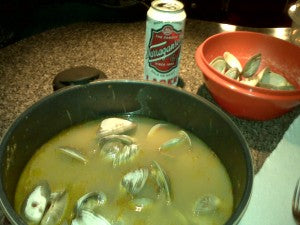
The Clam Can is on it's way and this time of everyone is having clam bakes or clam boils. We figured it would be best to educate everyone the best way to steam clams. This is just your basic, simple steamer recipe and you may or may not know some of these helpful tips. But we actually went quahogging the other day off the beach in Marion, MA. So the above photo is the result from steaming those littlenecks using this recipe. Taste and enjoy!
3 to 4 pounds live small hard-shelled clams - Here in New England they're called littlenecks or cherrystones. In the Pacific Northwest they are known as steamers. NOTE: If the shells of the live clams are open, tap on shell. If it does not close, throw away the clam.
3 tablespoons butter
1 small white onion, coarsely chopped
1 tblsp parsley
3 cloves garlic, lightly chopped
2 16oz cans Narragansett lager beer
½ teaspoon red pepper flakes
Melted unsalted butter*
Portuguese rolls from your favorite bakery
NOTE: The use of unsalted butter is imperative for this recipe, otherwise your clams will be too salty!
NOTE: FDA’s recommendations are to soak steamer clams for several hours in seawater (or 1/3 cup coarse kosher salt and 1 gallon water) to which you have added 1 cup cornmeal. Use kosher or sea salt as the iodine in regular salt will kill the clams before they hit the boiling water. My mother always used a little black and red pepper. She said it helps the clams spit out extra sand. No facts back this up, but it's always best to stick with tradition and do what your mother tells you.
One hour before serving, scrub clams with vegetable brush in cold water; rinse with water until free of sand (adding a little coarse salt to the water will help to remove the sand from the clams).
In a steamer pot or a large kettle, melt butter; saute onion and garlic until soft. Add Gansett and pepper flakes and bring to a slow boil. Add clams and cover pot with a tight-fitting lid and steam over low heat just until clams open, about 5 to 10 minutes. Do not over cook, as clams will become tough and rubbery (discard any clams that do not open).
Use tongs or a slotted spoon to transfer the clams to large individual soup bowls with individual cups of melted butter for dipping. Garnish with the parsley and serve.
Pour broth through a cheesecloth-lined strainer to remove any sand. The broth can either be used as a dunking liquid for the portuguese bread, broth to start a chowder or even a clam sauce for pasta.




